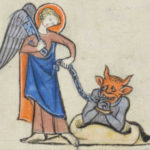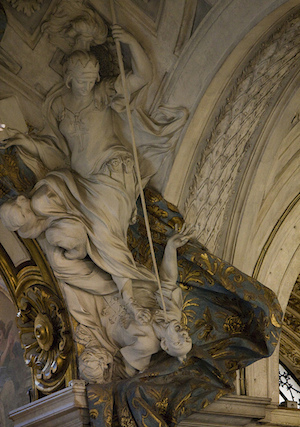We run our website the way we wished the whole internet worked: we provide high quality original content with no ads. We are funded solely by your direct support. Please consider supporting this project.
The Reality of Satan and the Spiritual Realm
A theme that underlies Jesus’ entire ministry is the apocalyptic assumption that creation has been seized by a cosmic force and that God is now battling this force to rescue it. Jesus understood himself to be the one in whom this battle was to be played out in a decisive way. The assumption is evident in almost everything Jesus says and does.
Jesus refers to Satan as “the prince” (archon) of this present age three times (Jn 12:31; 14:30; 16:11). The term archon was used in secular contexts to denote the highest official in a city or region. In short, Jesus acknowledges that Satan is the highest power of this present fallen world, at least in terms of his present influence. When Satan offers Jesus all “authority” over “all the kingdoms of the world,” Jesus does not dispute his claim that it was his to offer (Lk 4:5-6). Other writings explicitly teach that the whole world is “under the power of the evil one” (1 Jn 5:19), for Satan is “the god of the world” (2 Cor 4:4) and the ruler of the power of the air” (Eph 2:2).
Jesus addresses this evil “prince” as the leader of a relatively unified and pervasive army of spiritual powers and demons. Satan is thus called the “ruler of the demons” (Mt 9:34), and fallen angels are called “his angels” (Mt 25:41). On the basis of this assumed military unity, Jesus refutes the Pharisees’ contention that he exorcises demons by the power of Satan rather than the power of God. If this were so, Jesus argues, Satan’s kingdom would be working against itself (Mk 3:24) and could not exhibit the power it exhibits in this world.
Correlatively, Jesus taught that those who wish to make headway in tearing down this evil kingdom and in taking back the “property” of this kingdom must first tie up “the strong man” who oversees the whole operation (Mk 3:27). This could only be done when “one stronger than he attacks him and overpowers him” and thus “takes away his armor in which he trusted” (Lk 11:22). This, in a nutshell, is what Jesus understood himself to be doing by his teachings, healings, exorcisms and especially by his death and resurrection. His whole ministry was about overpowering the “fully armed” strong man who guarded “his property” (Lk 11:21)—the earth and its inhabitants who rightfully belong to God.
Jesus tied up the strong man so that he (and later, his church) could pillage the strong man’s kingdom. In fact, this is what Jesus’ teaching about the kingdom of God is all about. In the context of Jesus’ ministry, it is a warfare concept. “If it is by the power of God that I cast out demons,” Jesus teaches, “then the kingdom of God has come to you” (Lk 11:20). Where God reigns, Satan and his demons cannot. But otherwise, if the earth is to become the domain in which God is king (the kingdom of God), then it must cease being the domain in which Satan is king. This is what Jesus came to accomplish. He came to “destroy the works of the devil” (1 Jn 3:8: Heb 2:14) and to establish God’s domain on earth.
Every exorcism and every healing—the two activities that most characterize Jesus’ ministry—marked an advance toward establishing the kingdom of God over and against the kingdom of Satan. Consequently, in contrast with any view that would suggest that disease and demonization somehow serve a divine purpose, Jesus never treated such phenomenon as anything other than the work of the enemy. He consistently treated diseased and demonized people as casualties of war.
It is curious that the evil one to whom the Bible directly or indirectly attributes all evil has played a rather insignificant role in the theodicy of the church after Augustine. This, I contend, is directly connected to the fact that the church generally accepted the blueprint worldview that Augustine espoused. If we assume that there is a specific divine reason for every particular event that transpires, including the activity of Satan, then the ultimate explanation for evil cannot be found in Satan. It must rather be found in the reason that God had for ordaining or allowing him to carry out his specific activity. The New Testament, I submit, does not share this assumption.
—Adapted from Satan and the Problem of Evil, pages 35-37.
Category: General
Tags: Blueprint Worldview, Evil, Satan, Satan and the Problem of Evil, Spiritual Warfare, Warfare Worldview
Topics: Spiritual Warfare, Cosmic Conflict, The Problem of Evil
Related Reading

How Jesus Cursed the Curse
People who have committed to following Jesus are called to mimic even this aspect of Jesus’ life. As much as possible, we are to model what creation will look like when God’s Kingdom is fully come. We are to manifest as much as possible God’s original design for creation not only by how we love…

Romans 8:28: What Does It Mean?
The Bible is very clear that God has nothing to do with evil. There is “no darkness” in God. (I Jn 1:5). Far from intentionally bringing about evil, God’s “eyes are too pure to look on evil” (Heb. 1:13). All evil, therefore, must be ultimately traced back to decisions made by free agents other than…

Podcast: Does God Love Satan?
Greg talks about the potential of Satan repenting. A great question by Matthew! http://traffic.libsyn.com/askgregboyd/Episode_0412.mp3

Spiritual Warfare: What is it?
The Kingdom is “not of this world,” and neither is its warfare. Jews had always believed that God confronted spiritual opposition in carrying out his will on earth. In the Old Testament, these evil forces were usually depicted as cosmic monsters and hostile waters that threatened the earth. For a variety of reasons this belief…

Do You Know of Patients Who Have Benefitted from a Spiritual Warfare Worldview? (podcast)
Greg and Dan talk about spiritual warfare and mental illness. Episode 591 http://traffic.libsyn.com/askgregboyd/Episode_0591.mp3

Podcast: If the Crucifixion Is God’s Victory Over Satan, Why Does Satan Keep Fighting?
Greg talks already-but-not-yet, perspectives of the principalities, and the toilsome life of a muon. http://traffic.libsyn.com/askgregboyd/Episode_0284.mp3

